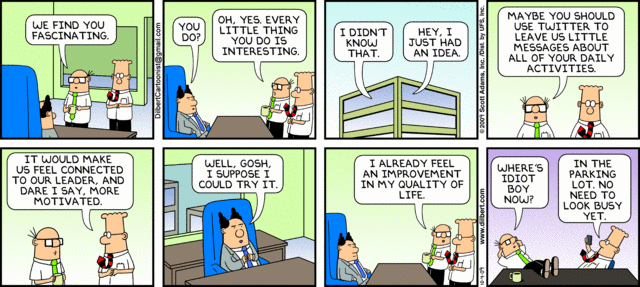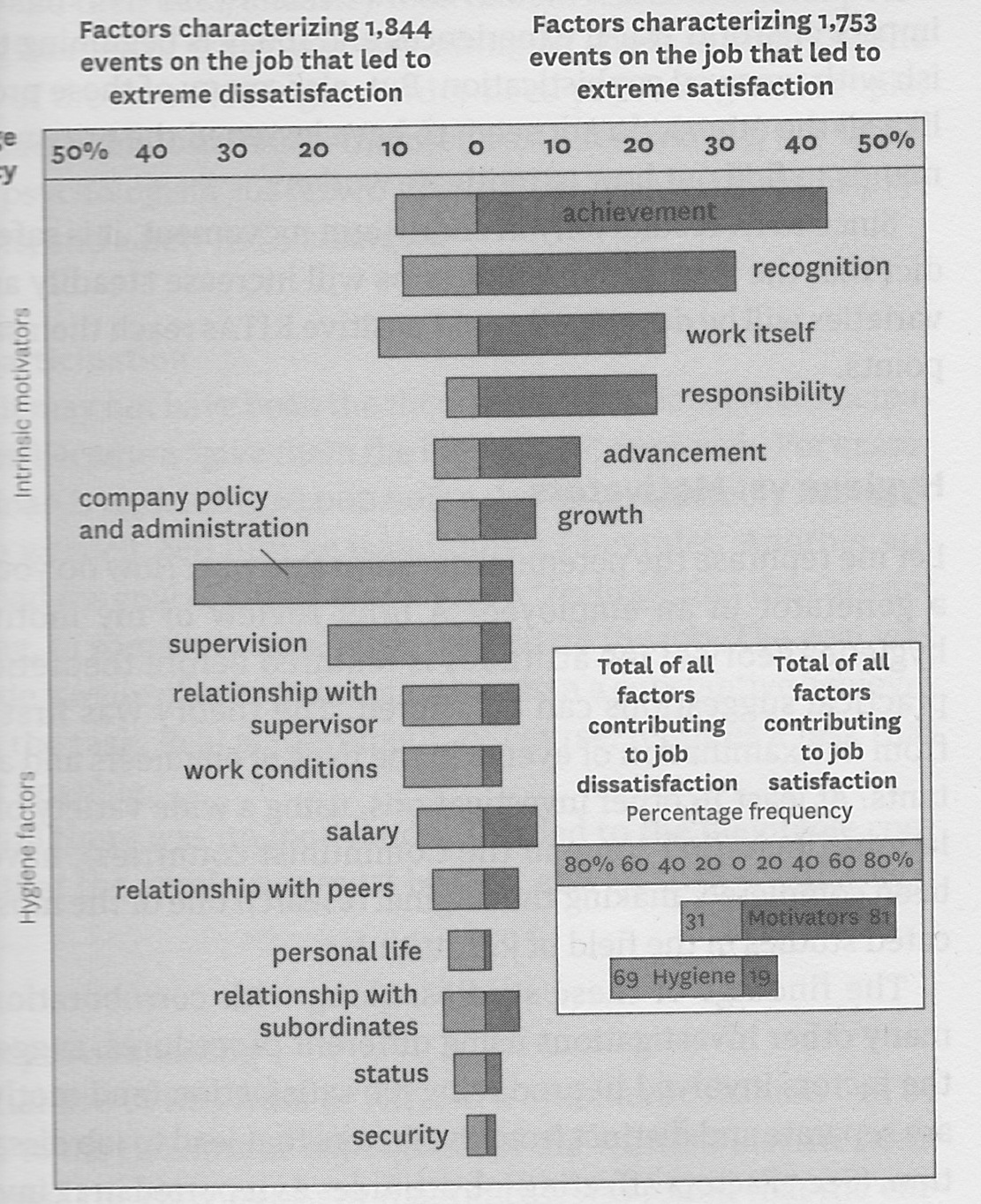10 Things The Greatest Leaders All Have In Common
.
I’ve posted a lot about effective leaders. Looking back, what patterns do we see?
Know The Power Of Feelings
Leaders who just focus on results don’t do nearly as well as those that also pay attention to relationships.
Via Social: Why Our Brains Are Wired to Connect:
Zenger found that if employees rated a manager as very high on “focus on results” (that is, one’s ability to get things done effectively), there was only a small (14 percent) chance that the manager would be rated among the top 10 percent of leaders overall. However, if in addition to “focus on results,” employees also rated the manager’s ability to “build relationships” very highly, then the likelihood of that person’s being rated as a great leader overall skyrocketed to 72 percent.
Paying attention to employee feelings matters.
What’s the difference between exemplary and good employees? They care.
Via Responsibility at Work: How Leading Professionals Act (or Don’t Act) Responsibly:
What strategies really improve organizations? Research involving 400 people across 130 companies came up with a simple answer:
You must change individual behavior by addressing employee feelings.
Via Switch: How to Change Things When Change Is Hard:
…the core of the matter is always about changing the behavior of people, and behavior change happens in highly successful situations mostly by speaking to people’s feelings.
(More on being a well-rounded leader here.)
…But Be Tough In A Crisis
The one time people definitely want a take-charge, decisive dictator is during a crisis.
Via Bold Endeavors: Lessons from Polar and Space Exploration:
…crew members expected leaders to make decisions regarding emergency matters as quickly and autocratically as necessary under the circumstances.
(More on balancing toughness with warmth here.)
Know What Makes Employees Stay And Leave
Employees are made happy by achievement, recognition, the work itself, responsibility and advancement.
They are most often made dissatisfied by policies, supervisors and work conditions.
Via HBR’s 10 Must Reads on Managing People:
(More on building great teams here.)
Judge People By What They’re Good At
If you want people who are competent at everything you’ll end up with a team of mediocrities.
Better to get the best person in a discipline and support them with others who can compensate for their weak spots.
Via The Effective Executive: The Definitive Guide to Getting the Right Things Done:
The task is not to breed generalists. It is to enable the specialist to make himself and his specialty effective. This means that he must think through who is to use his output and what the user needs to know and to understand to be able to make productive the fragment the specialist produces… We can so structure as to make the strength relevant. A good tax accountant in private practice might be greatly hampered by his inability to get along with people. But in an organization such a man can be set up in an office of his own and shielded from direct contact with other people. In an organization one can make his strength effective and his weakness irrelevant.
(More from the best management thinker ever here.)
Hubris Is Your Greatest Weakness
Don’t get full of yourself. That’s the downfall of nearly all great leaders.
In my interview with Harvard Business School professor Gautam Mukunda, author of Indispensable: When Leaders Really Matter, I asked him about the biggest mistake leaders make:
Gautam: Over time, it’s grandiosity.
Eric: Hubris?
Gautam: Yeah. You live in an environment where everybody constantly tells you how great you are, and you begin to believe it.
Eric: Yeah. Even Machiavelli said a leader needs people who are going to be honest with them, because everybody’s going to kiss their ass.
Gautam: Exactly… The CEO of a major corporation, how often does he or she hear the word “no”? How often does someone challenge their basic preconceptions about the world?
(More on resisting common leadership errors here.)
Culture Is What You Do, Not What You Say
Cultures are formed by the behavior that is rewarded in a company, not pretty words.
So if the top salesperson gets treated like a king — despite how abusively he treats people — congratulations, that’s your culture, no matter what’s on slide 47 of the PowerPoint deck.
Via How Will You Measure Your Life?:
If you don’t articulate a culture— or articulate one but don’t enforce it— then a culture is still going to emerge. However, it is going to be based on the processes and priorities that have been repeated within the organization and have worked. You can tell the health of a company’s culture by asking, “When faced with a choice on how to do something, did employees make the decision that the culture ‘wanted’ them to make? And was the feedback they received consistent with that?”
(More on building a rock solid company culture here.)
Know The Difference Between Leaders And Managers
The goal of management is consistency and order.
The goal of leadership is to motivate and create necessary change.
Management is about processes. Leadership is about people’s feelings.
Via John P. Kotter on What Leaders Really Do
Management controls people by pushing them in the right direction; leadership motivates them by satisfying basic human needs.
(More on moving from great manager to great leader here.)
Know Thyself
What can you learn from an Army Ranger about leadership? Knowing your limitations is key to being a great leader:
One company leader, socially was a buffoon and tactically he was a buffoon. But, he knew he was a buffoon… When we got to our site, he said to me, “You’ve got the training to protect this site. I don’t. Protect this site.” That’s all he had to say.
That taught me a very valuable lesson: “It’s okay not to know something.” There are people around you who do know something, and they can teach you. If it’s too grand a knowledge base to pick up right there, put them in charge. Have them report to you. Put the responsibility on them. If you do that, they will execute that to perfection, and I did.
(More on how effective leaders spend their time here.)
Convey Authority And Warmth
People expect leaders to carry themselves a certain way. What’s the secret? Convey authority and warmth.
Via The Silent Language of Leaders: How Body Language Can Help–or Hurt–How You Lead:
When first introduced to a leader, we immediately and unconsciously assess him or her for warmth and authority. Obviously the most appealing leaders are seen to encompass both qualities, and the least effective leaders are those we regard as cold and inept.
(More on how to appear like a leader here.)
Inspire By Showing People The Importance Of Their Jobs
How do you inspire people? Show them why their jobs are important.
Noah Goldstein, co-author of Yes!: 50 Scientifically Proven Ways to Be Persuasive, reviews a study:
Adam Grant, a scholar in the field of organizational behavior, realized that workers often fail to live up to their potential because they’ve lost track of the significance and meaningfulness of their own jobs. He figured that if he could remind employees of why their jobs are important, they might become more highly motivated, and therefore, more productive individuals.
What magic do both the speeches of Martin Luther King and the marketing of Apple have that move us to believe and act?
Simon Sinek, author of Start with Why: How Great Leaders Inspire Everyone to Take Action, has an interesting theory:
People don’t buy what you do. They buy why you do it… Start with “Why.”
(And when all else fails, yes, nagging works.)
Sum Up
Ten things you can do to be like the best:
- Know The Power Of Feelings
- …But Be Tough In A Crisis
- Know What Makes Employees Stay And Leave
- Judge People By What They’re Good At
- Hubris Is Your Greatest Weakness
- Culture Is What You Do, Not What You Say
- Managers Are About Processes, Leaders Are About People
- Know Thyself
- Convey Authority And Warmth
- Inspire By Showing People The Importance Of Their Jobs
Join 45K+ readers. Get a free weekly update via email here.
Related posts:
How To Make Your Life Better By Sending Five Simple Emails
6 Hostage Negotiation Techniques That Will Get You What You Want






